Table Of Contents
- 1Introduction
- 2Role of AI in University Admissions
- 3Key Benefits of Using AI in University Admissions
- 4Real-World Examples of AI in University Admissions
- 5Balancing the Benefits of AI in College Admissions with Ethical Concerns
- 6AI-Powered Application Screening in College Admissions.
- 7How AI Affects Students Applying to College
- 8How AI is Making College Admissions More Competitive
- 9Conclusion
Introduction
Artificial Intelligence (AI) is rapidly changing the way higher education operates around the world. According to a recent global survey by the Digital Education Council, 86% of students now use AI tools in their studies, with nearly one in four using them daily—a significant jump from 66% in 2024.
At the same time, AI adoption is growing at the institutional level. The 2025 EDUCAUSE AI Landscape Study reveals that over 54% of colleges use AI to enhance curriculum design, while about 52% automate administrative tasks such as admissions and scheduling. These trends highlight how AI in universities is becoming essential to making education more efficient, personalized, and accessible worldwide.
Role of AI in University Admissions
AI is rapidly changing university admissions by helping schools manage the rising number of applications more efficiently. Currently, 17% of American universities use AI in admissions, with that figure growing steadily.
Globally, over 50% of admissions leaders in the U.S., UK, Canada, and Australia believe AI will significantly impact how applications are evaluated, from sorting candidates to reviewing personal essays.
AI in universities speeds up initial screenings, identifies key traits beyond test scores, and supports a more holistic review. However, universities make it clear that AI is meant to assist, not replace, human decision-making to keep the process fair and thoughtful.
Key Benefits of Using AI in University Admissions
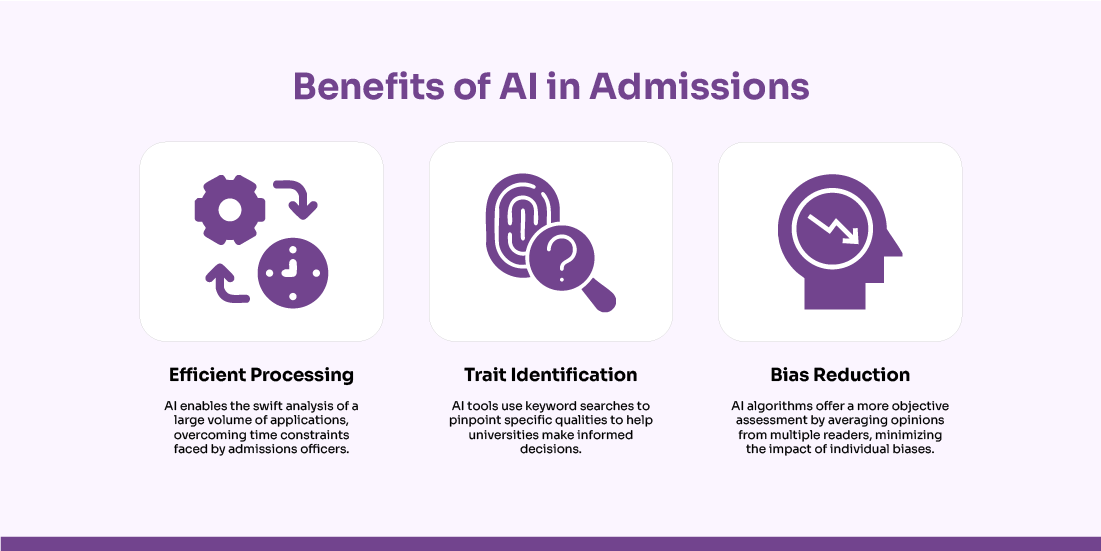
Artificial Intelligence is transforming how universities manage admissions—making the process faster, fairer, and more efficient. Below are some of the main advantages of integrating AI into admissions workflows:
Faster Application Processing
AI tools drastically reduce the time required to review applications. While admissions officers typically spend only about 6 minutes per application, AI can quickly analyse academic records, essays, and recommendation letters—allowing for more comprehensive evaluations in less time. Solutions like EDMO’s Document Intelligence help streamline this further by reducing manual document work by up to 40%, improving both speed and accuracy in application processing.
Enhanced Evaluation of Candidate Potential
AI goes beyond grades and test scores by detecting key personal traits such as leadership, teamwork, perseverance, and motivation. Through keyword analysis and data mapping, AI helps universities identify students who demonstrate qualities essential for long-term academic and personal success.
Reduction in Human Bias
One of AI’s greatest strengths is its ability to minimize individual bias in the admissions process. Unlike human reviewers, who may bring unconscious biases, AI evaluates candidates based on standardized inputs and aggregated data. In fact, 81% of college counselors believe that AI will help improve the fairness of college admissions in the next five years.
Consistent and Fair Application Review
AI reviews every application using the same rules, which helps keep the process fair and consistent. This is especially helpful for large universities that receive thousands of applications. According to an EDUCAUSE study, over half of colleges already use data-driven tools in their admissions process, with adoption expected to grow even further.
Improved Communication with Applicants
AI-powered chatbots significantly enhance applicant support by offering instant, 24/7 responses to questions about deadlines, documents, and application status. This reduces the workload for admissions staff and improves the applicant experience. At Purdue University, AI chatbots handled 82% of initial inquiries, with 71% of those happening outside of business hours. Impressively, 35.5% of users who interacted with the chatbot eventually applied.
Real-World Examples of AI in University Admissions
As application numbers continue to grow, AI in universities is playing a vital role in making admissions more efficient, fair, and effective. Here are some notable examples:
University of Pennsylvania
Researchers at the University of Pennsylvania conducted a groundbreaking study to evaluate AI’s ability to assess student applications. They trained the RoBERTa language model to identify seven key personal traits—including motivation, leadership, and perseverance—using a rating system developed by 36 experienced admissions officers.
The AI analyzed over 306,000 college essays, demonstrating a strong correlation with human evaluations. RoBERTa’s consistent application of institutional criteria highlights AI’s potential to improve scalability and fairness in admissions.
University of Sydney (Australia)
The University of Sydney, with more than 70,000 students and 26,000 staff, has integrated AI across its academic and administrative functions to promote inclusion and efficiency. Generative AI tools are actively used to prepare students for technology-driven careers.
In admissions and student support, AI helps ensure processes are both efficient and equitable. This initiative reflects the university’s strategic commitment to combining AI innovation with a focus on equity, access, and student readiness.
Georgia State University (USA)
Georgia State University has implemented AI tools to assist students during the admissions and enrollment process. These tools send automated reminders about deadlines, registration, and financial aid.
In a pilot program, students who received these reminders were 16% more likely to earn a B or higher, showing improved academic engagement and performance.
Read more: The Future of University Enrollment: Trends and Predictions
Balancing the Benefits of AI in College Admissions with Ethical Concerns
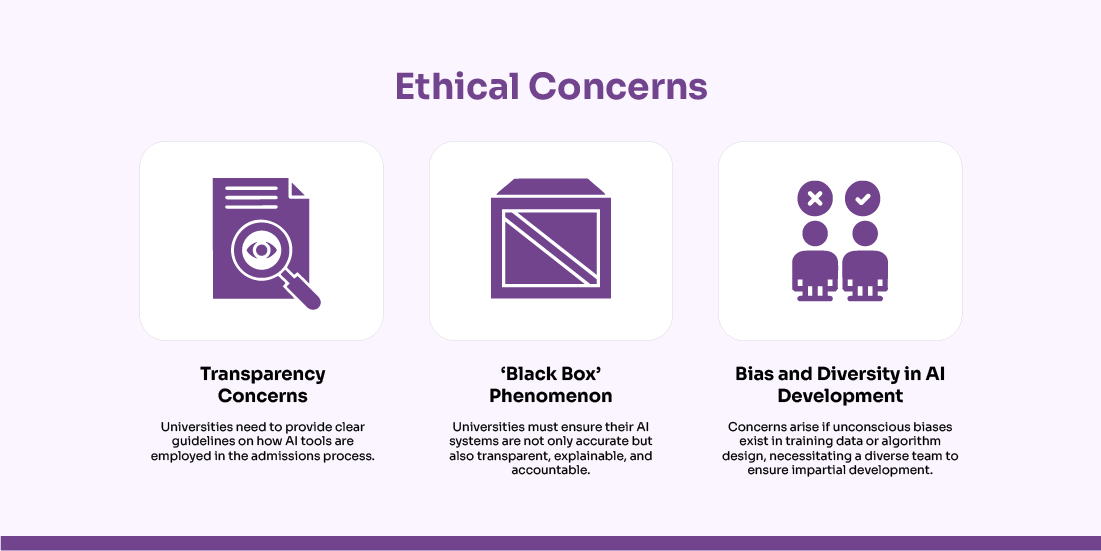
AI in universities is streamlining admissions by speeding up reviews and spotting top candidates. However, concerns around fairness, privacy, and transparency remain. To ensure ethical use, institutions must balance AI’s benefits with strong oversight and clear, fair practices.
Using AI to Promote Fairness and Diversity
AI has the potential to reduce human bias in admissions. Traditional processes can be affected by unconscious bias based on race, gender, or economic background. AI, when designed ethically, can ignore these factors and focus only on merit—such as grades and achievements. This allows colleges to select students more fairly and build a diverse student community.
Privacy and Data Protection
AI systems collect and process a lot of sensitive personal information from student applications. This raises concerns about how that data is stored, used, or shared. According to a recent survey, concern about data privacy in higher education increased from 50% to 59%, and concern about bias rose from 36% to 49%. These numbers show the need for stronger data security and ethical handling of student information.
Addressing the ‘Black Box’ Problem and Bias in AI
AI systems often work like “black boxes,” making it hard to understand how decisions are made. Studies have found that some predictive models incorrectly flag about 19% of Black and 21% of Hispanic students as likely to fail, while overestimating success for White and Asian students. Using transparent AI tools can reduce bias by up to 30%. To make AI fairer, colleges should involve diverse teams when building these systems, regularly check for bias, and keep humans involved in the final decision-making.
AI-Powered Application Screening in College Admissions.
Artificial Intelligence (AI) is increasingly helping colleges review applications faster by handling repetitive tasks. Rather than replacing humans, AI supports them by quickly and fairly analyzing transcripts, essays, and other materials.
Transcript and Test Score Analysis
AI simplifies the review of academic records by identifying grade trends, course difficulty, and standardized test scores like the SAT or ACT. It highlights upward academic progress and flags inconsistencies in performance. By analyzing context, AI offers deeper insight into a student’s academic background.
Essay and Personal Statement Evaluation
AI uses natural language processing (NLP) to evaluate grammar, structure, tone, and originality in essays. It can detect copied or AI-generated content and highlight standout submissions. However, since AI can’t fully grasp creativity or emotional depth, final reviews are still done by humans. For example, Virginia Tech has adopted a hybrid model from the 2025–26 cycle. Each application is now reviewed by both an AI tool and a human evaluator to balance efficiency with fairness.
Analyzing Letters of Recommendation
AI tools can scan letters of recommendation for key qualities like leadership, resilience, or academic strength. These letters are ranked based on the strength of language and sentiment. For example, UNC Chapel Hill uses AI to rate essays based on vocabulary, grammar, and sentence structure.
Assessing Extracurricular Activities
AI evaluates extracurricular involvement by examining activity descriptions, leadership roles, and length of commitment. It distinguishes between casual participation and meaningful contributions, such as holding a leadership position. Around 50% of colleges now use AI to review such details, making the process quicker and more accurate.
How AI Affects Students Applying to College
Artificial Intelligence (AI) is transforming how colleges review applications. From analyzing essays and grades to evaluating extracurriculars, AI is now deeply involved in admissions. For students, this means they need to understand how AI interprets their applications and how to present themselves authentically to stand out.
AI Is Changing the Way Essays Are Reviewed
College essays are no longer assessed solely by human readers. AI tools now analyze grammar, structure, tone, and overall clarity. These systems are also trained to detect plagiarism or AI-generated content, so relying on essay bots can hurt rather than help. While 1 in 3 students reportedly use AI for essay writing, it’s safer to use AI only for grammar checks or suggestions—not for writing the entire piece.
GPA and Test Scores Are Reviewed with More Context
AI in universities doesn’t just look at grades—it considers course difficulty, performance trends, and peer comparisons. This helps reward students who show growth and take on challenges. A survey by Ellucian found that 93% of higher education professionals plan to expand AI use for more accurate and consistent admissions decisions.
How AI is Making College Admissions More Competitive
Artificial Intelligence (AI) is transforming the college admissions landscape. While it brings efficiency and innovation, it also introduces new challenges, making the process feel more competitive than ever before.
Faster and More Efficient Application Review
AI helps colleges process a large number of applications much faster, speeding up the admissions timeline. For instance, Virginia Tech saw a massive rise in applications—from 17,000 to over 57,000 in just 20 years. Manually reviewing around 500,000 essays would take about 16,000 hours, or nearly eight years of full-time work. With AI handling initial screenings, the university can make decisions weeks earlier and ease the workload on its 200–300 volunteer reviewers.
Increase in Applications and Rising Competition
AI tools such as chatbots and virtual advisors have made it easier for students to navigate the college application process. They help applicants stay on top of deadlines, fill out forms, and meet requirements with less confusion. As a result, more students are submitting applications than ever before.
Shift Toward More Holistic Admissions
Admissions are no longer solely based on grades and test scores. AI now helps universities assess a student’s full profile—academic achievements, personal qualities, and extracurricular involvement. According to eCampus News, 57% of admissions officers are giving more weight to personal traits like leadership and resilience over test scores. This shift creates more opportunities for students with well-rounded experiences.
Greater Importance of Essays and Extracurriculars
Nearly 50% of colleges use AI-powered chatbots or tools to conduct initial interviews and evaluate essays, recommendation letters, and extracurricular involvement. These AI systems look for authenticity, storytelling, and meaningful engagement, helping predict a student’s potential success. As a result, well-rounded, genuine applications stand out more than ever.
Conclusion
AI technology is rapidly transforming universities by supporting smarter admissions processes, enhancing curriculum design, and providing personalized learning experiences. As AI continues to evolve, it will play an increasingly vital role in shaping the future of higher education. Using AI in universities can help improve student results, make daily operations easier, and keep institutions ahead in today’s fast-changing world.

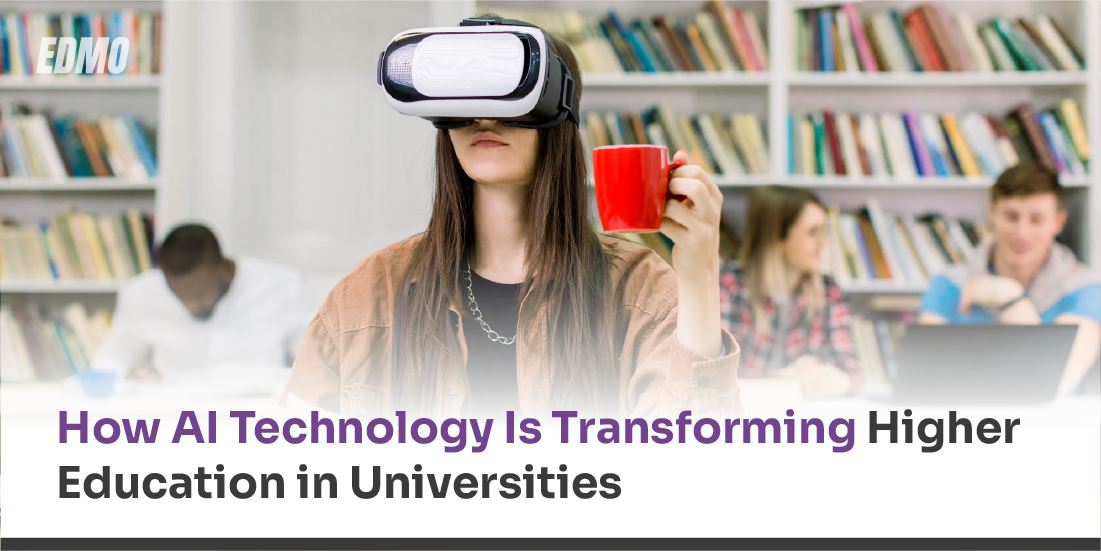
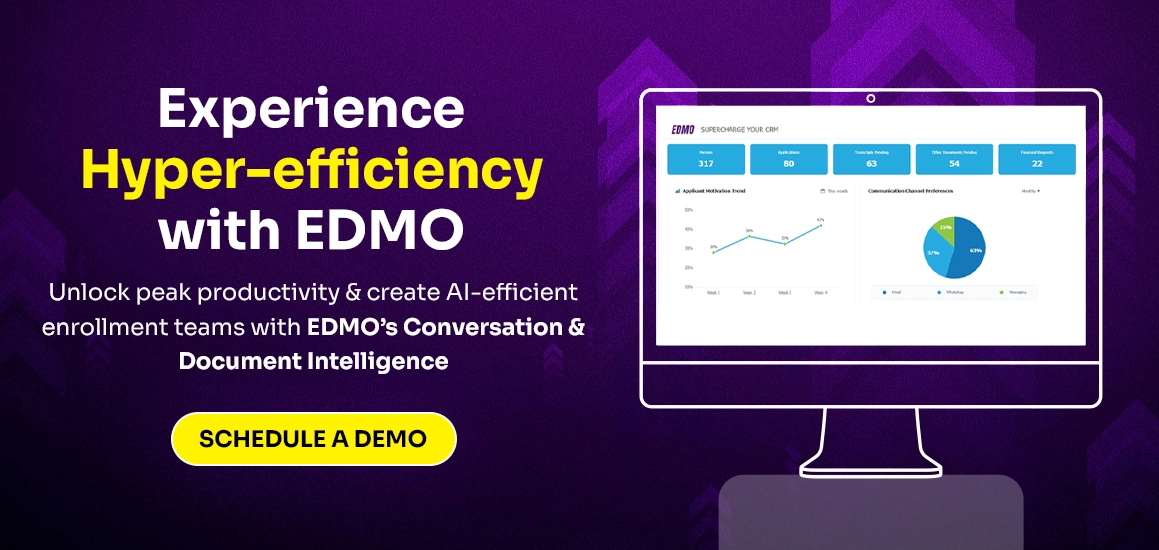
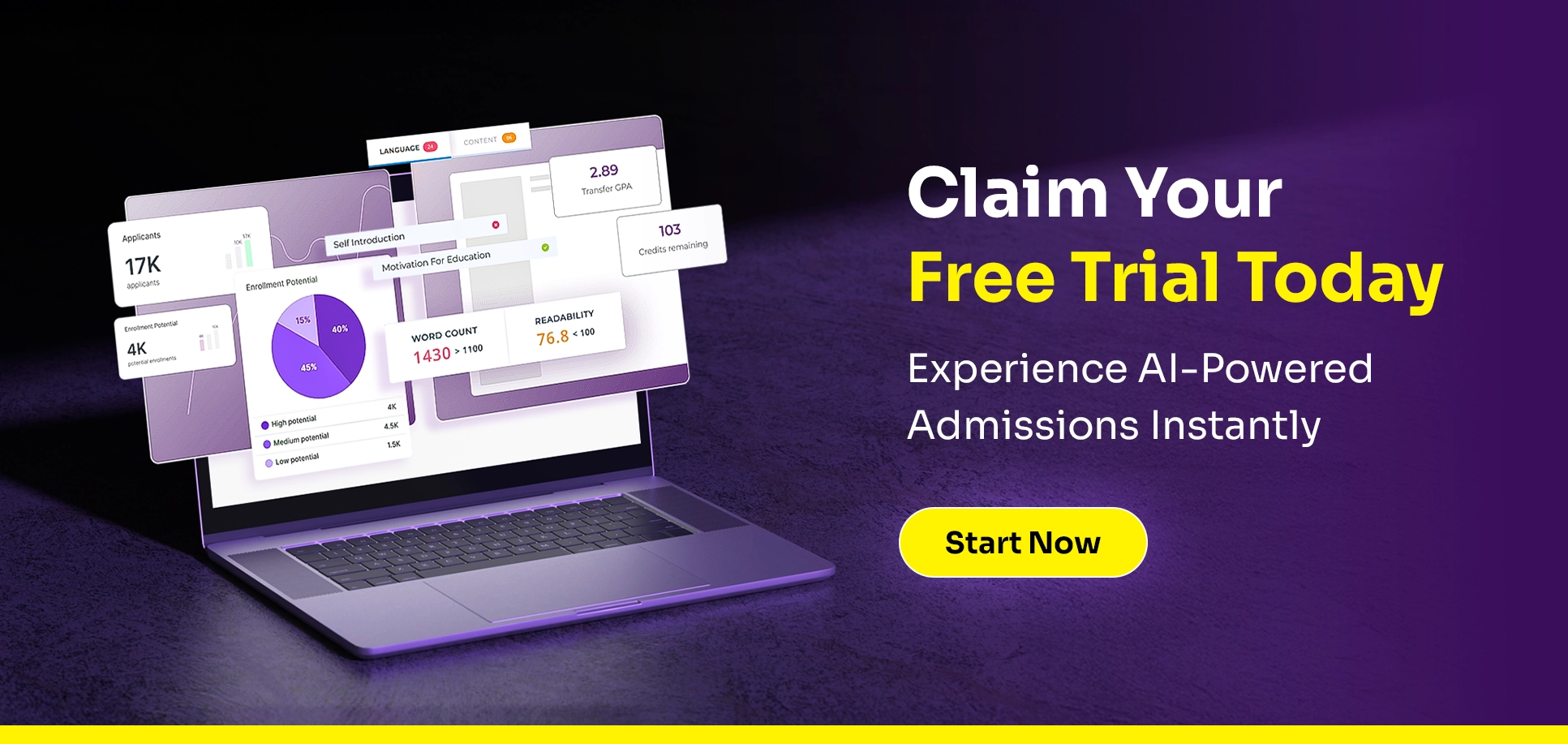


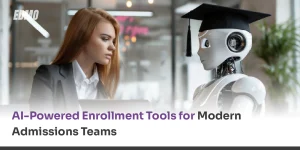
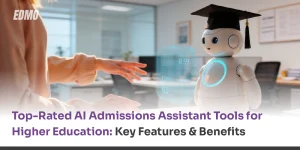
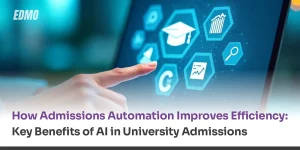
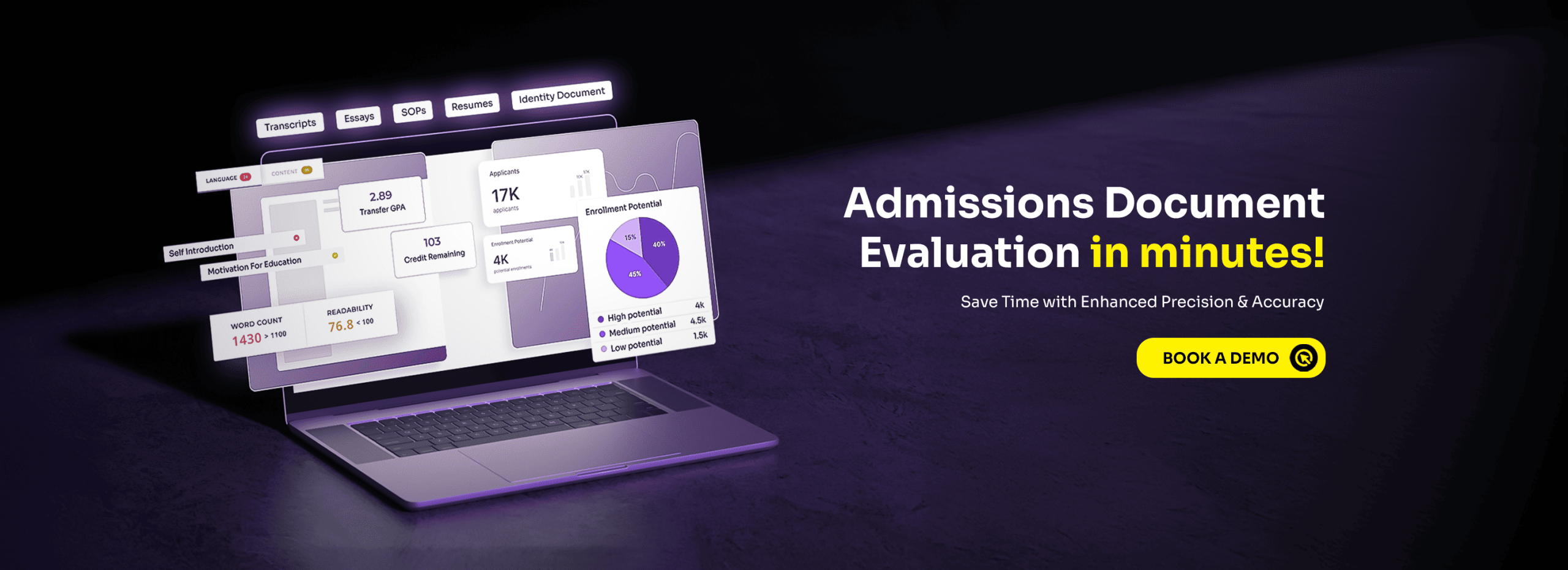
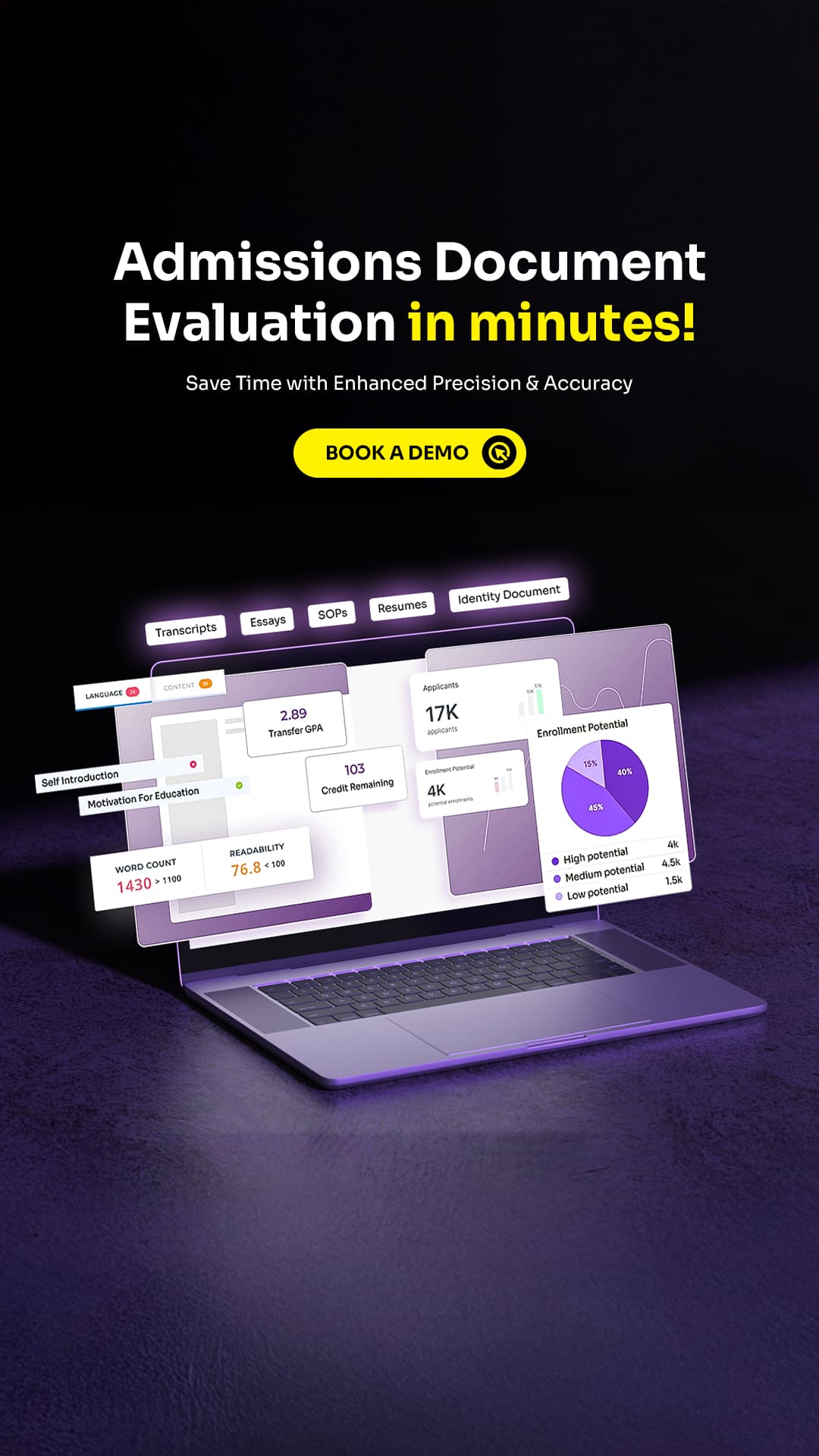
No comments yet. Be the first to comment!
Leave a Comment